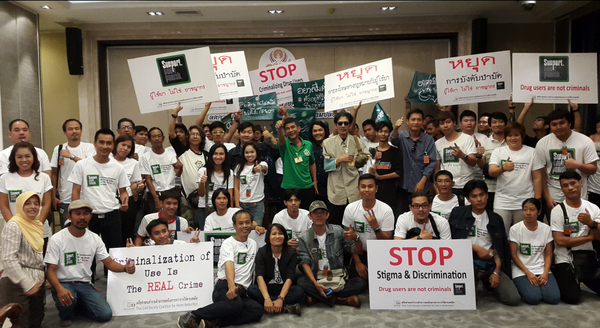Drug law reform coming to Thailand, but how far will it go?
Drug law reform is coming to Thailand — and it's scheduled to arrive sooner than you might think.
From the Royal Thai Police, to the Ministry of Justice (MoJ), to the Office of the Narcotics Control Board (ONCB), Thailand's law enforcement agencies have come to the unanimous consensus that drug law reform is sorely needed. And new legislation is being drafted as we speak.
Drug policy advocates should not get their hopes up just yet, however, for there are several key demands that have not yet been incorporated into the current draft of Thailand's new drug legislation.
As things stand, neither decriminalisation of drug use nor abolition of compulsory rehab feature in the current draft of Thailand's new drug laws — and, it ought to be noted, the current draft is the fifth in a series of at least six drafts scheduled to be completed before being submitted to parliament.
Drug law reform is indeed coming to Thailand, but it will most likely not be able to please everyone. At least not yet.
Between June 25 and July 7, a series of four public seminars held in Bangkok revealed serious fault lines between civil society drug law reformers and state actors who profess support for drug law reform. Suffice it to say — for want of a longer blog post! — that the former of these two groups is pushing for radical reform of current drug legislation — including the decriminalisation of all drug use — while the latter is opting for a more conservative set of revisions, such as lighter sentences for low-level drug offenders.
On Monday July 6, Justice Minister General Paiboon Khumchaya spoke before a packed hall at Bangkok's Grand Centara Hotel, at a seminar entitled: "Methamphetamine and 19 years of law enforcement policies: Results and fairer solutions."
Paiboon told his audience — which included judges, prosecutors, senior police commissioners, and public health officials — that Thailand's war on drugs has failed. He said that eradication of illegal drugs (การปราบปรามยาเสพติด) is a counter-productive policy goal, and one that should no longer be pursued. Such heavy-handed law enforcement strategies, said Paiboon, have led only to systemic police corruption, and prison cells overcrowded with non-violent offenders — mostly drawn from the ranks of the poor and impoverished.
On several occasions, Paiboon also acknowledged that Thailand now imprisons more females per capita than any other nation — mostly for low-level drug offences. At present, Paiboon explained, Thailand's total prison population surpasses that of Japan by almost 400 per cent, even though Japan is home to twice as many citizens as Thailand.
So what to do about all this? The first priority, said Paiboon, is to increase investment in voluntary rehabilitation services for people who use drugs, particularly methamphetamine users. And secondly, he said, we must retrain police on how to handle drug cases fairly.
Elsewhere in his speech, Paiboon explicitly stated that Thailand's compulsory rehabilitation system has failed, but he stopped short of calling for its abolition. One got the impression that Paiboon had to tread lightly on this issue, for fear of contradicting the latest draft of Thailand's new drug laws, which still include provisions for compulsory rehab.
Wirapan Ngami, a fearless orator and a coordinator at Thailand's 12-D Harm Reduction Network, says that removing compulsory rehab from the next draft — the 6th draft — of Thailand's new drug laws, will be a top priority for civil society and public health reformers.
The problem is, however, that the drafting committee is made up entirely of representatives from the MoJ and ONCB — so it is something of a closed club; a law unto itself.
In any case, it is heartening to see that open dialogue is taking place in Thailand on issues of drug law reform. The MoJ and ONCB may not yet have come round to the idea of abolishing compulsory rehab, but they are certainly willing to hear out the case.
As Wirapan so eloquently put it during the seminar at Centara: if 90 per cent of people who use drugs do not have a drug problem, then why must they be punished for their drug use by being locked away in a compulsory rehab centre?
We await the response of the drafting committee to this rebuke.
Keep up-to-date with drug policy developments by subscribing to the IDPC Monthly Alert.
Topics
Regions
Related Profiles
- International Drug Policy Consortium (IDPC)
